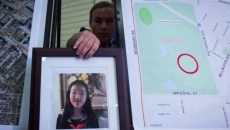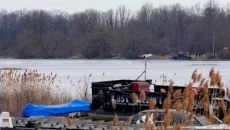An RCMP expert testifying at Ibrahim Ali's murder trial said the first DNA evidence linking the accused to the killing of a 13-year-old girl in Burnaby, B.C., came from a discarded cigarette butt.
Christine Crossman says Ali's DNA from the cigarette was then matched to the DNA recovered from the body of the girl who was found dead in Burnaby's Central Park six years ago.
Crossman has told a B.C. Supreme Court jury that only DNA from the teenager, whose name is protected by a publication ban, and Ali was found on swabs taken from the body — and the cigarette butt yielded only the accused's DNA, eliminating the possibility that it may have been contaminated and the match inaccurate.
"If there had been contamination of that sample, I would have seen indication of a second individual in the profile," she said, adding that she did not discover anyone else's DNA in the analysis of the cigarette.
Crossman told the court that Ali’s genetic profile is very rare, and it's unlikely another person on the planet shares his DNA.
“The estimated probability of selecting an unrelated individual from the Canadian Caucasian population with the same profile is one-in-one-quintillion,” she said, noting the number carries 18 zeros, and the total global population is currently estimated at about seven billion.
Ali has pleaded not guilty to first-degree murder in the death of the teenager, whose body was found on July 19, 2017, just hours after her mother reported her missing.
Crossman, an RCMP forensic biologist, said swabs were taken from the girl's vaginal and anal areas and "unknown male" DNA was found.
This was then matched to DNA on the “cast-off” sample from the cigarette butt that was labelled by police as coming from Ali and received by the lab on Aug. 27, 2018.
Crossman testified on Wednesday that the match led to police getting a warrant to formally obtain a DNA sample from Ali, which was collected and obtained by the lab on Sept. 17, 2018.
The DNA on the body swabs and cigarette butt "matched to the known sample … of I.A.," Crossman said, referring to Ali by his initials.
"Those profiles all matched," she told the court.
Prosecutor Colleen Smith centred her questioning of Crossman on the reliability of the RCMP forensic lab's DNA analysis that linked Ali to the girl, going through a thick pile of records compiled by the laboratory documenting all the procedures and checks put in place to ensure transparency.
The documents included checking any unknown DNA samples found on the evidence against lab personnel's genetic profiles to make sure no contamination took place.
"So, is it like in math class when we were in school, where you had to show your work?" Smith asked Crossman.
"Yes," she said in response. "We have to document everything that we have done, yes."
Crossman said the DNA analysis began under another scientist at the forensic lab who retired in December 2017.
The change in personnel didn't impact the analysis in any way, she said.
Crossman said she had fully reviewed and agreed with the previous scientist’s findings to the point where she was “taking ownership” of the results.
She further defended the reliability of the DNA assessment, saying the report was independently reviewed by another scientist based on exactly the same evidence, as is the procedure at the police forensic lab.
Any disagreement between Crossman, the previous leading scientist and the reviewer would have been documented with a memo, she said, and no such document was issued in the final report submitted to the court.
During earlier testimony, Crossman told the jury that the lab analyzed 14 pieces of evidence, 13 from the victim and one from the suspect, and detailed the lab’s protocol for chain of custody regarding exhibits.
She has not yet been cross-examined by Ali's defence lawyer, a process expected to take place Thursday after Smith concludes her questioning.
A pathologist who conducted the victim’s autopsy earlier testified the girl died by strangulation and was found with injuries including bruising, scraping and tearing on the back of her head, as well as to her face, arms and legs.
Crown attorney Isobel Keeley said in an opening statement in April that the court would hear evidence showing the murder was random, but DNA results would prove Ali sexually assaulted the girl.
She said the evidence would show the teen was passing through the park when she was dragged off a pathway into the forest by Ali, sexually assaulted and strangled.
The defence has not yet told the jury its theory of events.






